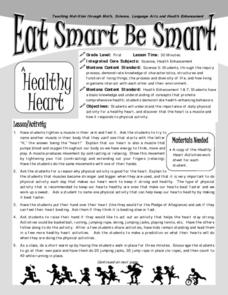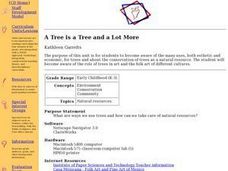Curated OER
Nutrition Lesson Plan
Second graders complete a survey as class answering the question: "Did you eat breakfast this morning?". They place a tally mark in the column that best represents their answer. They then discuss the results in the graph.
Out-of-School Time Resource Center
Nutrition and Physical Activity
Emerging nutritionists explore what it means to be healthy. In the beginning of the unit, your class will examine the five food groups and learn how food gets from the farm to our plates. This leads into the investigation of...
US Apple Association
Apples: A Class Act! (Grades Pre-K–3)
Discover the nutritional wonders of apples and get to know Johnny Appleseed with a plethora of learning experiences that cover subjects math, history, English language arts, health, and arts and crafts. Activities include an apple...
Curated OER
Bugs
Learners explore the wonders of bugs. For this bug lesson, students examine various types of bugs. Learners make crafts, sing songs, discuss nutrition, and investigate different types of insects.
Baylor College
Using Food Labels
Help your class make sense of nutrition labels with the ninth activity of this series. After explaining the different information provided on packaged food labels, perform an activity that demonstrates the amount of sugar in a single can...
August House
Go to Sleep, Gecko
Use this multidisciplinary lesson to delve into these subjects: English language arts, math, science, drama, and character education. After reading, discussing, and making interpretations about Go To Sleep, Gecko!: A Balinese...
Curated OER
My Pyramid
Students complete a graphing activity to learn about fruits and vegetables as well as their nutritional qualities. In this fruits and vegetables lesson, students complete a series of activities that help teach them about the health...
Curated OER
Nutrition: Gregory the Terrible Eater
Students listen to a story about a goat who craves human food. They discover the four basic food groups and discuss what they might eat if they were terrible eaters. Students retell the story by looking at the pictures. They complete...
Curated OER
Sippin' on Smoothies
Why is calcium good for the body? Where is it stored? Young chefs discover the importance of calcium and review a list of foods that are rich in the material. They then make delicious smoothies high in calcium! Teaching kids how to...
Baylor College
What's Is Soil Made Of?
It's time to roll up those sleeves and get a little dirty in the second lesson plan of this series on the science of food. Investigate where plants and animals get the minerals they need to live in this two-part exploration of soil....
Montana Office of Public Instruction
Eat Smart Be Smart
Get children's blood pumping with this primary grade instructional activity on the human heart. After learning about the important role this muscle plays in the human body, students monitor their heart rates and discover the...
Baylor College
Food Webs
Explore various ecosystems from around the world as your class discovers the interdependence of all living things. Using the provided sets of ecosystem cards, young scientists work in small groups building food webs to demonstrate the...
Baylor College
Do Plants Need Light?
Turn your classroom into a greenhouse with a lesson on plant growth. First, investigate the different parts of seeds, identifying the seed coat, cotyledon, and embryo. Then plant the seeds and watch them grow! Measure the new plants...
Baylor College
Plant Parts You Eat
Plants provide a variety of delicious foods essential for human survival. In the fourth lesson of this series on food science, young scientists investigate common fruits, vegetables, and grains in order to determine which plant part is...
Baylor College
Bio Build-up
Trace pollutants through the environment in the seventh instructional activity of this series on the science of food. Looking at a picture of the plants and animals in an aquatic ecosystem, learners use dot stickers to represent harmful...
Baylor College
They're Everywhere: Bacteria
Totally gross out your class with the eighth lesson in this series on food science. Explore the microscopic world of bacteria by taking swabs of different classroom objects and growing colonies in petri dishes. An engaging activity that...
Baylor College
What's That Food?
Get things cooking with the first lesson in this series on the science of food. Working in small groups, young scientists make and record observations about different mystery foods. These descriptions are then shared with the class and...
Baylor College
Digestion
Digestion is an amazing and complicated process that provides humans with the energy they need to survive. Lesson six in this series on the science of food uses sliced turkey and a meat tenderizer to demonstrate how enzymes help break...
Curated OER
A Billion Hungry People
Students discover the inequality of food distribution. In the hunger lesson, students discuss how some places and people do not get the food they need to survive. Students role play distributing pretend meals to people (of unequal...
Curated OER
A Tree is a Tree and a Lot More
Pupils listen as the teacher reads "The Giving Tree." they discuss all the things the tree gave the boy throughout his life. They discuss ways they benefit from trees. This studying culminates with a tree walk and planting a tree in a...
Other popular searches
- Nutrition Math Bmi
- Nutrition Math In
- Nutrition Math Preschool
- Nutrition Math Bm
- Nutrition Math 2nd Grade
- Nutrition Math 3rd Grade
- Nutrition Math Lesson Plans
- Math Nutrition
- Math and Nutrition
- Math Lesson Plans on Nutrition
- Math, Nutrition





















